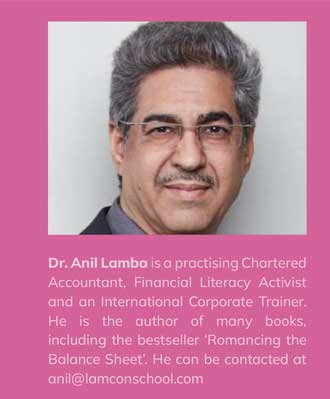

In India, startups have become the new trend, the dream of most engineering & business management graduates, and even of many drop-outs.
The last few years have seen several being set up in every conceivable feld. Of late, however, we have also witnessed a reverse trend. Not only has there been a fall in the number of new startups springing up, but many of them are shutting shop. Also, the decrease in the inflow of funds this year has resulted in some minnows merging with older and larger ventures.
For every startup that succeeds, there are many hundreds and thousands that fail despite being highly innovative and well- funded. The reasons are many, but most are related to financial mismanagement.
If budding entrepreneurs paid half as much attention to the financial aspect of their business idea, as that given to the technological, marketing, valuation and fund-raising aspects, the chances of survival and success would be far greater.
Here is a short list of what an entrepreneur should do to run a sustainable business.
Be Clear About The Revenue Model
Much thought goes into the ‘idea’ that has captured the entrepreneur’s imagination and not enough attention is paid to the fnancials and the revenue modelling. Without a clear idea of how and from where the revenues are going to be generated, the venture would be a non-starter.
Businesses cannot be run for long on investors’ money alone. It is okay during the gestation period, but soon the business must generate enough revenues to at least meet the operational costs.
Generate Profits and Not Sales
Selling is a means towards achieving an end, and the end is to make a decent, healthy proft. If your role models are the Flipkarts and the Ubers of this world, with all energies concentrated on generating volumes while making cash losses per order/ride, you must also understand that you need to have very deep pockets to continue doing that for any length of time. Chances are quite strong that the business will go belly up well before a white knight investor comes along to invest his millions impressed by the sales volume.
While drawing up the business plan, there should be complete clarity on how the business is going to make profits.
Pay attention to the cash flows
One of the frst lessons that an entrepreneur learns is that there is no connection between the proft that a business earns and the bank balance that it has. In fact, if there is a connection, it is inverse. The higher the proft, the lower the bank balance. (This article is too short for me to elaborate further, but take my word for it right now).
‘Where is the money?’ is a question that perpetually haunts an entrepreneur. Accountants tell you that the business is making impressive sales and profts, but where is the money? Why can’t you see it in the bank? Well, you are making a proft precisely because your money has been deployed. If you started hoarding it in the bank it would be a matter of time before you would stop making a profit too.
There is no pleasure in making proft if, at the end of the month, you do not have the money to pay salaries. Always remember that successful businesses stand on two pillars:
1) the ability to generate profit, and
2) the ability to effectively manage cash flow.
Working capital is highly essential
While evaluating the funds that a start-up needs, it is relatively easy to understand the amount of fxed capital required. But often the working capital requirement is not clearly understood. Consequently, many such ventures are starved of the working capital for sustaining the operations on a day-to-day basis.
Among those businesses that close down due to a shortage of funds, a large percentage do so due to a shortage of working capital.
Working capital is required:
1. for purchasing materials and maintaining inventories (in case of organisations engaged in manufacturing/trading).
2. to meet day-to-day operational expenses.
3. And where goods and services are sold on credit, working capital is required to invest in your customers too.
It is suicidal to use short-term funds for long-term purposes
Start-ups must take great pains to ensure that only long-term funds are used for long- term purposes and short-term funds are used for short-term purposes.
Never ever use short-term funds for long- term purposes. It would be suicidal to do so. If start-ups pay heed to the financial management aspect of their business it will go a long way towards sustaining their venture and making it a success.





